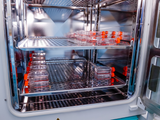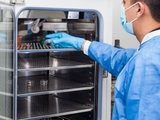Types of Laboratories | Laboratory Categories
From diagnostic laboratories to university labs, there is a wide range of laboratory types. To learn more about the specific purposes, practices, and functions of the most common types of labs, read this guide on the different types of laboratories.
Here are some essential laboratory categories:
Diagnostic laboratories
Diagnostic laboratories primarily run tests on clinical specimens such as urine, blood, triglycerides, or cholesterols. Health professionals complete such tests to gain patient health information regarding disease prevention, diagnosis, and treatment. Often, they may request follow-up tests to gain more data and an increased level of certainty regarding the rejection or approval of a diagnosis. At times, such tests may be highly specialized.
Hospital laboratories
Similar to diagnostic laboratories, hospital laboratories primarily run tests on clinical specimens to gain information regarding patient health. Such information typically pertains to diagnosis, treatment, and disease prevention. In addition, hospital laboratories receive funding through grants and frequently run a variety of assays. The main differences between these two types of laboratories are that hospital labs connect to a hospital and sometimes perform emergency work.
National laboratories
The United States Department of Energy sponsors the research that researchers conduct in national laboratories. Such research focuses on science and the humanities and involves completing tests that are either qualitative or quantitative. Responsibilities of such science laboratories include undertaking various energy-related national projects such as the nation’s nuclear weapons program or the Human Genome Project.
Clinical laboratories
Clinical laboratories undertake several lab procedures to help physicians diagnose, treat, and manage patients. Such labs will analyze and test clinical specimens collected from patients to address the needs of medical and public health. To provide easy access to physicians and patients, clinical labs are often located within or near a hospital. Typically, these healthcare facilities have units that pertain to subjects such as Microbiology, Genetics, Hematology, Virology, or Toxicology.
Research and university laboratories
Research and university laboratories focus on either scientific research or research in the humanities. Researchers in these science laboratories will typically work with or alongside principal investigators and post-doctorates. Often, university laboratories will include research labs as well as teaching labs where student demonstrations and classroom practices take place.
Since 2010, USA Lab Equipment has provided necessary materials and machinery to different types of science labs across the country. To help supply facilities with everything they need, we stock over 1,000 competitively priced equipment items—from lab chillers to glassware. For more information regarding our equipment, contact us today.
Explore Popular Articles
How a Vac Oven Can Revolutionize Your Drying Process
In industries where precision drying is critical – such as pharmaceuticals, food processi...
Secrets to Mastering the Vacuum Purge: Process for Cleaner Extracts
Modern extraction systems pull out most solvents quickly, but those last traces demand careful...
Maintenance and Care 101: How to Prolong the Lifespan of Your Vacuum Oven
Vacuum ovens are indispensable in industries like pharmaceuticals, electronics, and cannabis process...




